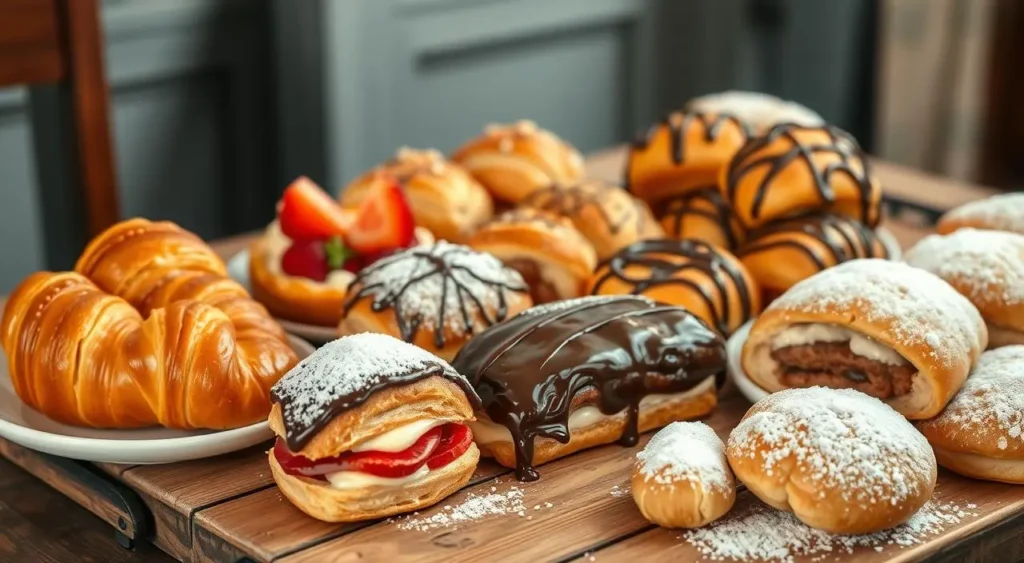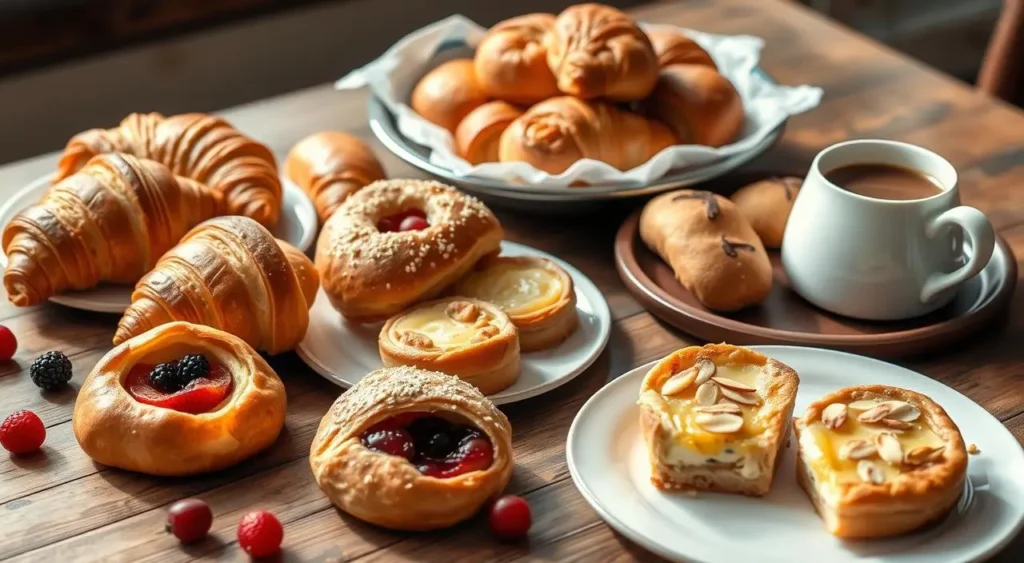Reading time: 13 minutes
Imagine waking up to the warm, buttery aroma of fresh pastries wafting through your kitchen. Breakfast pastries are more than just food—they’re an experience, transforming simple mornings into something extraordinary. Whether it’s a flaky croissant, a fruity Danish, or a comforting cinnamon roll, these treats bring a special kind of joy to your table.
Baking your own pastries allows you to control ingredients, experiment with flavors, and enjoy the satisfaction of creating something truly delicious. Let’s explore the world of breakfast pastries and learn how to make mornings unforgettable.
Table of contents
- The history of breakfast pastries
- The Joy of Homemade Pastries
- Croissants: The Classic Breakfast Pastry
- Danishes: Sweet Indulgence
- Apple Turnovers: A Comforting Dessert for Breakfast
- Cinnamon Rolls: A Breakfast Staple
- Pastelitos: Latin-Inspired Flaky Pastries
- Exploring International Breakfast Pastries
- Breakfast Pastries: A Bite of Homemade Delight
- Common Pastry Ingredients and Their Roles
- Conclusion
- FAQs
The history of breakfast pastries
Breakfast pastries have a long history, blending cultures from early European settlers. They come from England, France, and the Netherlands. This mix has created the tasty breakfast treats we love today.
The flaky croissant, from France, is a favorite worldwide. Danish pastry, with its sweet fillings and layers, is also a hit. These pastries bring joy to our mornings.
But there’s more to breakfast pastries than just croissants and Danishes. They come in many sweet and savory varieties. Each one has its own taste and texture, thanks to special ingredients and baking techniques. For more inspiration, check out the best American breakfast guide for creative ideas to elevate your mornings.
The history of breakfast pastries shows how baking changes with the seasons. It uses local ingredients and flavors. This shows how these treats have evolved to please different tastes and occasions.

When you make your own breakfast pastries, you join a long tradition. Each recipe tells a story, inviting you into the world of baking. It’s a journey of flavors, techniques, and personal touches that make every pastry special.
The Joy of Homemade Pastries
Making homemade pastries is a fun experience that beats buying them. Baking fills your kitchen with amazing smells, making you feel better. A survey shows 45% of home bakers love using fresh ingredients, making each bite special.
When you make the best breakfast pastries at home, you pick the ingredients and flavors. This makes them a personal achievement. Serving warm pastries to loved ones adds to the joy.
Benefits of Baking Pastries at Home
Homemade pastries taste much better than store-bought ones. They don’t have preservatives, so they’re healthier. Interest in homemade baking has grown by 30% during the pandemic.
This shows people want better quality and sustainable food. Baking can make you 20% happier, proving it’s a great way to feel good.
For quick and simple recipes that rival bakery-quality treats, explore these best pancake breakfast recipes.
Time-Saving Tips for Busy Mornings
It can be hard to balance a busy life with baking. But, there are ways to make fresh pastries even on busy days. You can make dough ahead and freeze it.
Quick recipes can be made in under 30 minutes. Using store-bought dough is another way to save time. It’s a chance to enjoy gourmet pastries without much effort.

Croissants: The Classic Breakfast Pastry
Croissants are a favorite breakfast treat around the world. Their flaky texture and buttery taste make mornings better. Making them at home might seem hard, but it’s doable. Learning how to make them can turn you into a breakfast pastry expert.
With a bit of patience and the right steps, you can make perfect, golden croissants. They’re a treat that’s worth the effort.
The Process of Making Flaky Croissants
The secret to flaky croissants is the lamination technique. Start with cold butter and chilled dough. Roll the dough into a rectangle, then add softened butter in the middle.
Fold the sides over to make a book-like shape. Chill and roll the dough several times, folding it each time to build layers. This process takes over six hours, but it’s worth it for the taste.
Shortcut Recipes: Try using tortillas as a creative pastry base. Wondering if it works? Learn more in Can I Use Tortilla Instead of Pastry?.
Tips for Using Store-Bought Dough
For a quicker option, use store-bought croissant dough. It lets you enjoy warm, flaky croissants without spending hours in the kitchen. Unroll the dough, cut it into triangles, and roll each one up tightly.
Try adding different fillings like chocolate, almond paste, or ham and cheese. This way, you can make simple croissants into gourmet treats that wow your guests or make your breakfast more exciting.
Danishes: Sweet Indulgence
Danish pastries, also called “wienerbrod,” are a treat with flaky layers. They started in Denmark in the 1800s. These pastries come in many shapes and fillings, like fruit preserves, cream cheese, and custards.
They are a great choice for homemade breakfast treats. You can add your favorite flavors to make a special treat for the morning.
Types of Danish Fillings You Can Use
Being creative with fillings is key. Here are some classic favorites:
- Raspberry jam
- Apple filling
- Almond paste
- Cream cheese
- Marzipan
- Cinnamon sugar
These fillings add flavor and texture to your breakfast pastries. Mixing them up lets you create unique treats for any time.
Shortcut Danish Pastry Dough Recipe
For a quick Danish taste, try this easy recipe. It makes a flaky dough:
- Ingredients:
- 1 cup all-purpose flour
- 1/2 cup unsalted butter, cold and cubed
- 1/4 cup granulated sugar
- 1/4 teaspoon salt
- 1/4 cup ice-cold water
- In a large bowl, mix flour, sugar, and salt.
- Add cold, cubed butter and mix until crumbly.
- Slowly add ice-cold water until it forms a dough.
- Wrap in plastic wrap and chill for 30 minutes.
- Roll out the dough, cut into shapes, add fillings, and fold.
- Bake at 375-400°F (190-200°C) for 15-20 minutes.
This quick dough makes homemade breakfast pastries fast. It’s a great start to baking.
| Filling Type | Flavor Profile |
|---|---|
| Raspberry Jam | Tart and sweet |
| Apple Filling | Sweet and spiced |
| Cream Cheese | Rich and creamy |
| Almond Paste | Nutty and sweet |
| Marzipan | Sweet and chewy |
This table shows the different flavors you can use. Mixing fillings creates even more delicious pastries.
Apple Turnovers: A Comforting Dessert for Breakfast
Apple turnovers are a delightful treat for breakfast or dessert. They are easy to make, letting you enjoy fresh pastries in your kitchen. Just use puff pastry and spiced apples for a quick, tasty breakfast.
Ingredients and Steps to Create Apple Turnovers
To make these tasty apple turnovers, you’ll need:
- 1 sheet of puff pastry
- 2 cups of diced apples (about 3 small apples)
- 1 teaspoon of ground cinnamon
- 1 tablespoon of lemon juice
- ¼ cup of brown sugar
- 1 tablespoon of butter
- 1 large egg yolk, for egg wash
Here’s how to make them:
- Preheat your oven to 400 degrees Fahrenheit.
- In a skillet, melt the butter over medium heat. Add the diced apples, cinnamon, lemon juice, and brown sugar. Sauté for about 5 minutes, until the apples are tender.
- Roll out the puff pastry and cut it into squares, creating four portions.
- Place ½ cup of the apple filling in the center of each square, then fold the pastry over and seal the edges with a fork.
- Brush the tops with egg wash for a golden finish.
- Bake for 20 minutes or until the turnovers are golden brown and puffy.
These steps make four apple turnovers, great for a small group or family breakfast. Each turnover has 177 calories and little sodium, making it a good choice for those watching their diet.
Creative Variations on Classic Recipes
Don’t stick to just apples. Try these variations for a new twist:
- Use different fruits like peaches, berries, or pears for a seasonal touch.
- Add spices such as nutmeg or ginger for an extra kick.
- Mix in cheeses, like brie or cream cheese, for a savory version.
These ideas keep making these pastries easy while letting your creativity flow. You can enjoy a comforting treat any time of day.
Cinnamon Rolls: A Breakfast Staple
Cinnamon rolls are a top choice for breakfast, adding warmth and comfort. You can make them at home with just a few ingredients. They’re quick to make, using refrigerated crescent roll dough, and ready in under 30 minutes. Follow these steps for a treat that everyone will enjoy.
How to Prepare Cinnamon Rolls in Under 30 Minutes
To make cinnamon rolls fast, you’ll need:
- 1 can refrigerated crescent roll dough
- 1/4 cup butter, softened
- 1 cup light brown sugar
- 1 tablespoon ground cinnamon
- 1 cup heavy cream
Here’s how to make them:
- Preheat your oven to 350°F (175°C).
- Roll out the crescent roll dough on a flat surface.
- Spread softened butter over the dough.
- Mix brown sugar and cinnamon, then sprinkle evenly over the buttered dough.
- Roll the dough tightly into a log and slice into 12 equal pieces.
- Place the rolls in a greased baking dish, and pour heavy cream over them.
- Bake for 25-30 minutes or until golden brown.
Each roll has about 169 calories. This makes them a guilt-free, enjoyable breakfast choice.
Frosting Options to Enhance Flavor
Your cinnamon rolls need a tasty frosting. Here are some options:
- Cream Cheese Frosting: Mix 4 ounces of room-temperature cream cheese with 1/2 cup of unsalted butter and 3 cups of powdered sugar for a rich topping.
- Vanilla Glaze: Mix powdered sugar with a splash of vanilla extract and enough milk to make it pourable.
- Cinnamon Sugar Drizzle: Blend powdered sugar with cinnamon and a bit of heavy cream for a sweet topping.
These frostings let you customize your pastries, making each batch unique and delicious.
Pastelitos: Latin-Inspired Flaky Pastries
Pastelitos are a favorite in Latin cuisine. They are flaky and can be filled with sweet or savory ingredients. A favorite is guava and cream cheese, showing their versatility. The dough is light and airy, making each bite heavenly.
Making pastelitos is easy. You can use thawed puff pastry for convenience. Here’s what you need:
- Oven Temperature: 400°F
- Prep Time: Approximately 20 minutes
- Cook Time: 20-25 minutes
- Total Pastry Yield: 8 pastries
- Filling Size: Each piece of cream cheese and guava paste should be 1 oz, about ¼-inch thick
- Puff Pastry Sheets: 2 sheets needed for 8 equal squares
- Egg Wash: 1 large egg white, whisked
- Sugar Topping: ¼ cup of sparkling sugar for added crunch
- Cooling Time: Allow to cool on the baking sheet for about 10 minutes before serving
Each pastelito has about 290 calories. They’re perfect for a satisfying breakfast. You can enjoy them warm or store them for up to three days.
Bringing pastelitos into your kitchen brings a taste of Latin culture. It’s a joy to make and enjoy these delicious breakfast treats!
Exploring International Breakfast Pastries
Breakfast pastries are a delightful mix of cultures. They add excitement to your morning. From England to Italy, each Shortcut Recipes country has its own special treats.
A Glimpse into English Breakfast Pastries
In England, breakfast pastries are a big deal. Scones are a favorite, enjoyed warm with clotted cream and jam. They come in many flavors like plain, fruit, cheese, and lavender.
Crumpets are also popular, great for butter, honey, or spreads. They add a special touch to English breakfasts.
Italian Breakfast Pastries You Should Try
Italy is known for its delicious breakfast pastries. Cornetti are like croissants but sweeter, enjoyed with coffee. They often have chocolate or apricot jam inside.
Brioche is another Italian favorite, soft and flavorful. It pairs perfectly with a hot drink. These pastries show Italy’s love for quality and taste.
Breakfast Pastries: A Bite of Homemade Delight
Making homemade breakfast pastries is a fun experience. It lets you use fresh ingredients and customize to your liking. Whether you make gourmet or classic pastries, the joy of baking is unmatched. Each homemade treat is a special treat, filled with effort and love.
Why Homemade Pastries Are Worth the Effort?
Homemade pastries taste better and are fresher than store-bought ones. You control the ingredients, making them healthier and tastier. Baking can be calming and rewarding, perfect for relaxing in the kitchen. Enjoying warm pastries, whether alone or with family, is a treat.
Storage Tips for Fresh Breakfast Pastries
To keep homemade pastries fresh, use these storage tips:
- Freezing: Wrap each pastry in plastic wrap and put them in freezer bags for long storage.
- Airtight containers: Store cooled pastries in airtight containers at room temperature for the best taste.
- Reheating: Reheat pastries in a low oven for a few minutes to make them taste like they just came out of the oven.
Here’s a table showing the nutritional values of homemade breakfast pastries per serving. They’re a healthy choice:
| Nutrient | Amount per Serving |
|---|---|
| Calories | 150 kcal |
| Carbohydrates | 2g |
| Protein | 10g |
| Fat | 11g |
| Saturated Fat | 5g |
| Cholesterol | 113mg |
| Sodium | 445mg |
| Vitamin A | 236 IU |
| Calcium | 111mg |
| Iron | 1mg |
Common Pastry Ingredients and Their Roles
Knowing the ingredients that make your breakfast pastries special is key. Butter and yeast are very important in making the best pastries. They add texture and flavor, making your morning treats unforgettable.
Butter: The Key to Flakiness
Butter is essential for flaky layers in pastries. It makes them light and airy. Use cold butter to create pockets in the dough for a crisp texture.
For flakiness, choose high-fat butter like European-style. It has about 82% fat. This ensures your pastries are flaky.
Here are some tips for using butter:
- Keep your butter chilled until just before use.
- Cut butter into small cubes to mix it evenly with the flour.
- Incorporate butter quickly to prevent it from warming up; this maintains those critical layers.
The Importance of Yeast in Pastry Creation
Yeast is key for making pastries that rise and are light. It ferments the dough, creating air pockets. This makes the pastry lift during baking.
Choosing the right yeast is important. Active dry yeast or instant yeast affects how fast your dough rises. Make sure to activate your yeast correctly for the best rise.
Here are key points to remember when working with yeast:
- Use warm liquids to activate dry yeast but avoid hot water that might kill it.
- Let your dough rise in a warm spot, which ensures a better fermentation process.
- Monitor your dough; it should double in size before proceeding to the next step.
| Ingredient | Role | Tips |
|---|---|---|
| Butter | Creates flakiness through layering | Use cold and high-fat butter |
| Yeast | Promotes rise and texture | Activate with warm water |
| Flour | Provides structure | Select appropriate flour type based on desired texture |
| Sugar | Adds sweetness and aids browning | Use brown sugar for moisture |
| Salt | Enhances flavor | Add at 1-2% of flour weight |
Mastering these ingredients will help you make delicious breakfast pastries. They will impress your family and friends. Knowing how to use these ingredients and techniques will lead you to pastry perfection.
Conclusion
Baking homemade breakfast pastries makes your morning special. You get to enjoy fresh flavors and feel proud of your work. This article has shown you many recipes and techniques to make your kitchen smell amazing.
There are so many types of breakfast pastries, from sweet to savory. You can make everything from apple turnovers to flaky scones. Don’t be afraid to try new things and mix up your recipes.
Homemade breakfast pastries can make your meals more enjoyable. They add a cozy touch to your day. By baking from scratch, you create memories and make your breakfast time even better. Start baking and enjoy the tasty journey ahead!
FAQs
Start with classics like croissants, apple turnovers, and Danishes. For inspiration, check out these best pancake breakfast recipes.
For delicious pastries, use high-quality ingredients and follow recipes carefully. Patience during baking is key. Making pastries from scratch lets you tailor flavors to your liking, making them gourmet.
Yes! Quick breakfast pastries include cinnamon rolls made in under 30 minutes. You can also make apple turnovers with pre-made puff pastry. These options offer fresh pastries without a long prep time.
Absolutely! Store-bought dough saves time and tastes great. By shaping and filling it, you can make gourmet pastries that feel homemade.
Customize pastries by trying different fillings and flavors. For example, add various fruits or spices to apple turnovers. You can also swap cheese and meats in pastelitos. This lets you get creative in the kitchen.
Store pastries in airtight containers or freeze them for longer. Reheating tips can also keep your pastries warm for days. This makes breakfast convenient and tasty.
Homemade pastries taste better and are fresher than store-bought ones. You can also choose ingredients based on your diet. It’s a rewarding baking experience.
Enjoy baking and make your mornings a little sweeter with homemade breakfast pastries!

